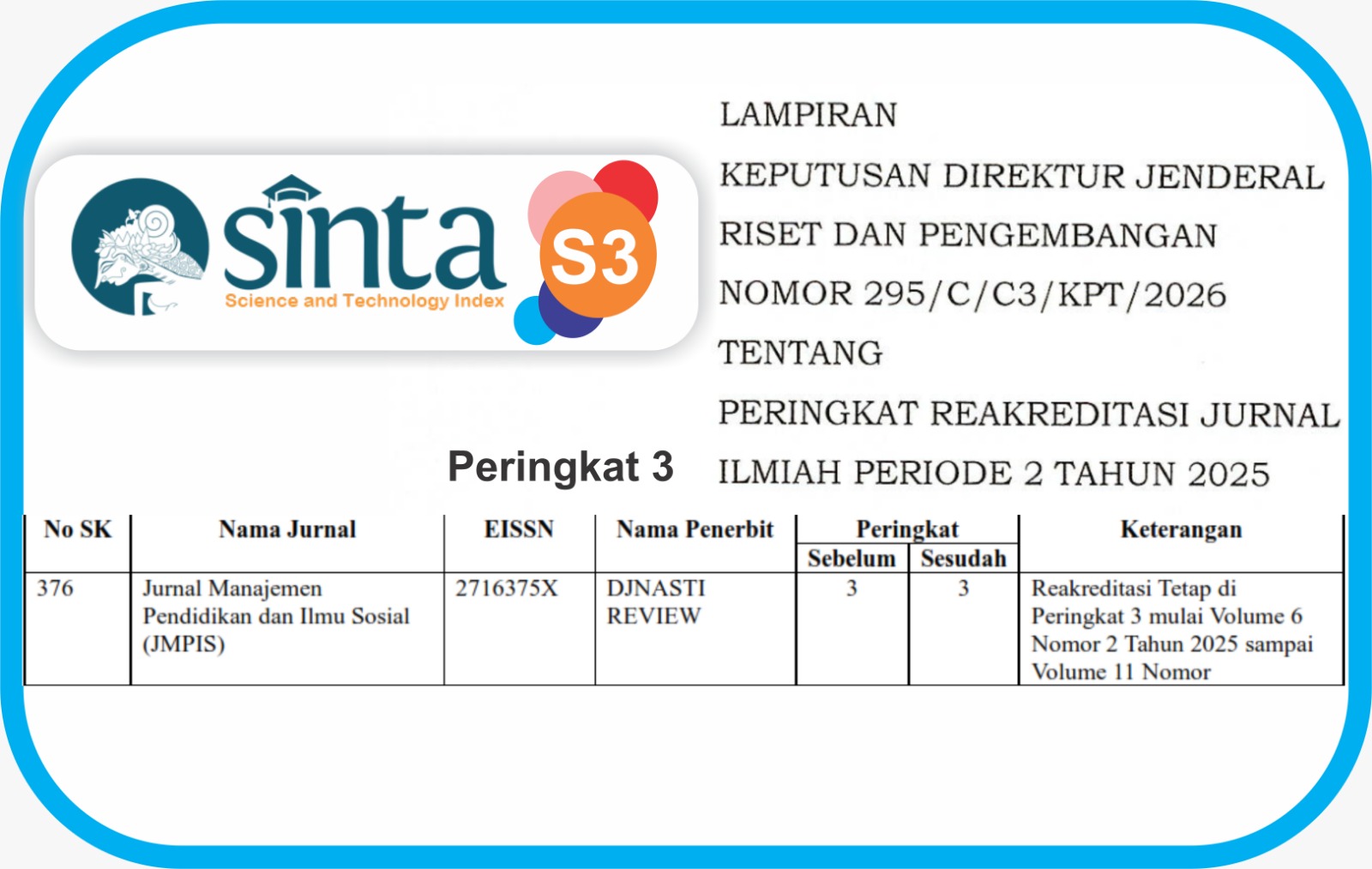Pengaruh Model Pembelajaran Inkuiri Berbasis Masalah Terhadap Keterampilan Berpikir Kritis & Hasil Belajar Peserta Didik dengan Locus Of Control Berbeda
DOI:
https://doi.org/10.38035/jmpis.v6i3.4383Keywords:
Hasil Belajar, Kemampuan Berpikir Kritis, Locus Of Control, Pembelajaran Inkuiri Berbasis MasalahAbstract
Penelitian ini adalah untuk melihat seberapa besar pengaruh model pembelajaran inkuiri berbasis masalah diterapkan akan memberikan dampak pada keterampilan berpikir kritis serta hasil belajar peserta didik kelas VIII di SMP Negeri 1 Kotabaru dengan memperhatikan locus of control. Penelitian ini menggunakan metode kuantitatif dengan desain kuasi eksperimen menggunakan dua kelompok yaitu eksperimen dan kontrol yang kemudian akan dikomparasikan. Selanjutnya, keefektifan model dalam meningkatkan keterampilan berpikir peserta didik dan hasil belajar diukur dengan instrumen penilaian hasil belajar, tes keterampilan berpikir kritis, dan kuesioner locus of control. Hasil Penelitian sebagai berikut : 1) Model pembelajaran inkuiri berbasis masalah secara signifikan meningkatkan keterampilan berpikir kritis peserta didik, 2) Model pembelajaran inkuiri berbasis masalah juga berdampak positif terhadap hasil belajar peserta didik, 3) Mengungkapkan bahwa locus of control memengaruhi keterampilan berpikir kritis dan hasil belajar peserta didik. Secara keseluruhan penelitiaan ini terbukti bahwa model pembelajaran inkuiri berbasis masalah secara signifikan dapat mendorong keterampilan peserta didik dalam berpikir secara kritis dan hasil belajar mereka ke taraf yang lebih tinggi, meskipun terdapat variasi locus of control di antara mereka.
References
Akpur, U. (2025). Metacognitive Awareness and Creativity: The Mediating Role of Critical Thinking. Journal of Creativity, 100096. https://doi.org/10.1016/j.yjoc.2025.100096
Al-Thani, N. J., & Ahmad, Z. (2025). Learning through “Research Cognitive Theory”: A new framework for developing 21st century research skills in secondary school students. Heliyon, 11(2), e41950. https://doi.org/10.1016/j.heliyon.2025.e41950
Bogador, C. J., Camarao, M. K. G., Matunding, C. G., Jean, K., & Sombria, F. (2024). CHALLENGES AND BENEFITS OF INQUIRY-BASED LEARNING IN PHYSICS INTERNATIONAL JOURNAL OF MULTIDISCIPLINARY?: APPLIED Challenges and Benefits of Inquiry-Based Learning in Physics. July. https://doi.org/10.11594/ijmaber.05.07.26
Botha, F., & Dahmann, S. C. (2024). Locus of control, self-control, and health outcomes. SSM - Population Health, 25 (July 2023), 101566. https://doi.org/10.1016/j.ssmph.2023.101566
Budría, S., Betancourt-Odio, A., & Wirth, E. (2023). Does internal locus of control get you out of homelessness? Economics Letters, 230, 111249. https://doi.org/10.1016/j.econlet.2023.111249
Commodari, E., Sole, J., Guarnera, M., & La Rosa, V. L. (2024). Mental imagery in education: What impact on the relationships with visuospatial processing and school performance in junior high school students? Thinking Skills and Creativity, 54(October), 101667. https://doi.org/10.1016/j.tsc.2024.101667
Contreras, N., Liesa, E., & Giralt-Romeu, M. (2024). How pre-service teachers change their view of forms of inquiry after participating in an inquiry-based practicum. Teaching and Teacher Education, 140(January), 104478. https://doi.org/10.1016/j.tate.2024.104478
Cook, P. (2025). There is more to life than sport: Debating popular culture to develop critical thinking skills. Journal of Hospitality, Leisure, Sport and Tourism Education, 36(September 2024), 100537. https://doi.org/10.1016/j.jhlste.2025.100537
Egitim, S. (2024). Promoting gender-inclusive leadership perceptions among Japanese university students: A nine-week critical inquiry-based action learning program. International Journal of Educational Research Open, 7(January), 100362. https://doi.org/10.1016/j.ijedro.2024.100362
Hari Rajan, M., Herbert, C., & Polly, P. (2025). A synthetic review of learning theories, elements and virtual environment simulation types to improve learning within higher education. Thinking Skills and Creativity, 56(August 2022), 1–18. https://doi.org/10.1016/j.tsc.2024.101732
Hoang, G., Trong, T., Tran, Q., & Yang, M. (2024). The International Journal of Management Education The impact of narcissism on entrepreneurial intentions?: The roles of entrepreneurial alertness , entrepreneurial passion , and internal locus of control. The International Journal of Management Education, 22(3), 101021. https://doi.org/10.1016/j.ijme.2024.101021
Hu, J., Kang, T., Zhang, J., & Ma, X. (2024). The chain mediating effect of learning goal distress and excessive learning motivation from unknown locus of control on migrant middle school students’ learning anxiety. Acta Psychologica, 248(January), 104350. https://doi.org/10.1016/j.actpsy.2024.104350
Khonkla, J., Thumsiriwat, J., & Supakesorn, B. (2024). Learning outcomes of an integrated inquiry-based and problem- based learnings for grade 8 science students. August. https://doi.org/10.53889/jgl.v4i1.366
Kohout-Diaz, M. (2025). Advancing an inclusive research approach in humanities and social sciences: The crucial role of self-study and narrative enquiry in doctoral research experiences. Social Sciences and Humanities Open, 11(October 2024), 101256. https://doi.org/10.1016/j.ssaho.2024.101256
Nicoletti, P., Zafer, S., Matok, L., Irron, I., Patrick, M., Haklai, R., Evangelista, J. E., Marino, G. B., Ma’ayan, A., Sewda, A., Holmes, G., Britton, S. R., Lee, W. J., Wu, M., Ru, Y., Arnaud, E., Botto, L., Brody, L. C., Byren, J. C., … Peter, I. (2024). Regulatory elements in SEM1-DLX5-DLX6 (7q21.3) locus contribute to genetic control of coronal nonsyndromic craniosynostosis and bone density-related traits. Genetics in Medicine Open, 2, 101851. https://doi.org/10.1016/j.gimo.2024.101851
Novitra, F., Abdullah, M. N. S., Özdemir, E., Riyasni, S., Emiliannur, Festiyed, & Metra, P. (2025). Design of Dual Space Inquiry framework for facilitating flexible learning in digital technology era. International Journal of Educational Research Open, 8(February 2024). https://doi.org/10.1016/j.ijedro.2024.100424
Taggart, D., Wright, K., Griffin, H., Duckworth, L., Baxter-Thornton, M., Coates, S., Lewis, E., Maxted, F., Shellam, K., Tuck, C., & Ford, S. (2025). Lived experience consultants to a child sexual abuse inquiry: Survivor epistemology as a counterweight to legal and administrative proceduralism. Child Abuse and Neglect, 159(October 2024), 107147. https://doi.org/10.1016/j.chiabu.2024.107147
Zeng, X., & Ravindran, L. (2025). Design , implementation , and evaluation of peer feedback to develop students ’ critical thinking?: A systematic review from 2010 to 2023. Thinking Skills and Creativity, 55(June 2024), 101691. https://doi.org/10.1016/j.tsc.2024.101691
Zhang, Y., & Hu, J. (2024). Fatalism and depressive symptoms among Chinese college students: Mediation models of locus of control and positive coping. Heliyon, 10(6), e27617. https://doi.org/10.1016/j.heliyon.2024.e27617.
Downloads
Published
How to Cite
Issue
Section
License
Copyright (c) 2025 Heldy Adynata Putra Pratama, Christina Ismaniati

This work is licensed under a Creative Commons Attribution 4.0 International License.
Hak cipta :
Penulis yang mempublikasikan manuskripnya di jurnal ini menyetujui ketentuan berikut:
- Hak cipta pada setiap artikel adalah milik penulis.
- Penulis mengakui bahwa Jurnal Manajemen Pendidikan dan Ilmu Sosial (JMPIS) berhak menjadi yang pertama menerbitkan dengan lisensi Creative Commons Attribution 4.0 International (Attribution 4.0 International CC BY 4.0) .
- Penulis dapat mengirimkan artikel secara terpisah, mengatur distribusi non-eksklusif manuskrip yang telah diterbitkan dalam jurnal ini ke versi lain (misalnya, dikirim ke repositori institusi penulis, publikasi ke dalam buku, dll.), dengan mengakui bahwa manuskrip telah diterbitkan pertama kali di Jurnal Manajemen Pendidikan dan Ilmu Sosial (JMPIS).











































































